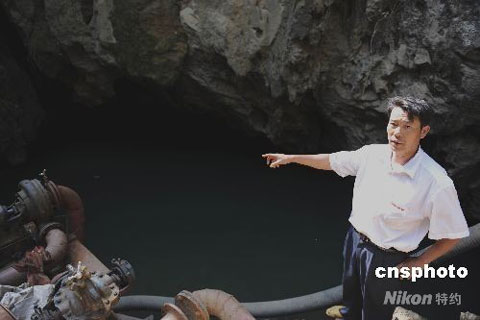According to government of Hechi City in south China's Guangxi Zhuang Autonomous Region, medical tests carried out on October 8 found 200 people with excessive amounts of arsenic in their urine. Nineteen people were kept in hospital for observation, Chinanews.com reported today.
 |
|
One of the villagers who drank water contaminated by arsenic explains how water sources came to be polluted. |
The poisoning incident affected two villages in the Hechi area. The city's disease control centre said as many as 387 villagers might have excessive amounts of arsenic in their urine.
An investigation conducted by environmental protection agencies confirms that the immediate cause of the incident was Typhoon Hagupit which triggered heavy rainfall on September 25 and caused a waste water treatment pond belonging to the Jinhai Metallurgic Chemical Company to overflow. The waste water, which contained arsenic, polluted a nearby pond and ground water sources.
The Guangxi medical authorities have dispatched 20 medical experts to Hechi City to help treat the victims.
According to Ge Xianmin, head of the Guangxi Occupational Disease Prevention and Control Institute, investigations show that some victims have absorbed arsenic into their bodies and a few have mild symptoms of arsenic poisoning. He said that those mildly affected can be treated as outpatients. The body's natural detoxification process will remove arsenic over time, but treatment speeds up the process and eliminates the poison within 9 to 15 days.
The incident caused concern among Guangxi's top leaders. Guo Shengkun, secretary of the Party Committee of Guangxi Zhuang Autonomous Region, and Ma Biao, chairman of Guangxi Zhuang Autonomous Region, made clear that people's lives and health must be given top priority. The Guangxi police department, health department, environmental protection department, and disease control department, all sent experts to deal with the incident on the spot. Two deputy chairmen of the Guangxi government visited the site in person.
 |
|
Poisoned villagers describe their symptoms. |
Hechi City has tested its urban tap water and found no traces of arsenic. The Long Jiang river was also declared free of contamination.
The Chinanews.com reporter noted that Hechi City, although small, has a large number of metallurgical enterprises that are potential threats to the local environment.
(China.org.cn by Zhang Ming'ai, October 8, 2008)